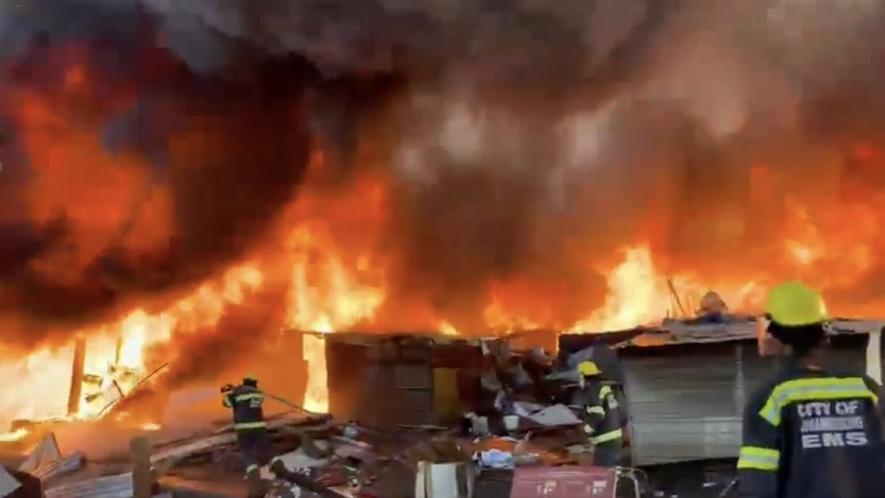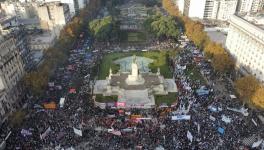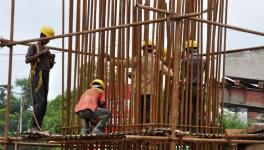Neoliberalism Responsible for Deadly Johannesburg Fires: Union

Johannesburg Emergency Management Services responding to the fire at the Selby settlement in Johannesburg. Photo: Screenshot
200 working-class families in South Africa have been left homeless after their shacks were claimed by a fire that swept the Selby informal settlement in the Booysens suburb of Johannesburg on the night of January 26.
Another fire on January 21 in the Diepsloot slum in the northern part of Johannesburg killed a young woman and a toddler. A day prior, 11 shacks in an informal settlement in the Honeydew suburb were burnt down.
Reports on all these incidents state that the cause of the fire was undetermined. However, the General Industries Workers Union of South Africa (GIWUSA) maintains that the cause is clear: the housing crisis caused by neoliberal policies of the state.
“The root cause of these fires is not accidental, but rather a result of the deliberate neglect and abandonment of our working-class communities” by a State implementing neoliberal policies, said its statement on January 29.
“For the working class, these policies have made ownership of housing” next to impossible “as every cruel cycle of interest rate hikes brutally strips them of houses, cars and other assets they are forced to sell.” In the absence of an emergency public housing program, masses of the working class are crammed into slums, sheltering in shacks built of easily inflammable materials. Lacking electricity supply, candle lamps are often used for lighting in these settlements.
Slums have become “deadly traps”
Almost a quarter of the country’s population relies on wood, coal, and charcoal for cooking on open flames, according to the Statistics Department’s 2023 Household Survey. The vulnerability to fire outbreaks due to these flames is further enhanced in the slums by the tangle of wires tapping electricity in the absence of government supply.
With the worsening economic crisis, increasing sections of South Africa’s working class are being forced into such slums, which GIWUSA describes as “deadly traps”.
Fires burning down the shacks in the slums “are one of the leading causes of unnatural death in South Africa… Shack fires occur every day, killing and injuring hundreds of people each year, destroying livelihoods and deepening poverty,” states a research paper for the UN Office for Disaster Risk Reduction (UNDRR) published late last year.
“The consequences of fires can be profound…They also destroy livelihoods. Already poor
households often lose everything they own. This includes important documents such as identity… cards and birth certificates, which are needed to access state-support grants and other safety nets.”
True to this UN warning about victims losing their IDs in such fires, the government has complained about the Selby fire-affected “households’ lack of willingness to participate in the verification process.”
For many of them, who are poor migrants from neighboring countries without adequate papers, despite having made a major labor contribution to South Africa’s industries, coming forward for verification would mean deportation, explained GIWUSA’s president Mametlwe Sebei.
“About 200 households have submitted their names for verification thus far, and in some instances, the information is incomplete,” said the Department of Human Resources in a statement on January 30. Operating with “limited resources”, the South African government insists that the “victims need to have proper identification documents that can be verified” in order to receive State assistance.
“It is important that those who lost documents due to the fire approach the nearest Home Affairs for a replacement document or provide sworn affidavits to help fast-track assistance,” adds its statement.
“They are talking nonsense,” maintains Sebei. “My experience is that often they require the impossible. I mean they require IDs and other papers which people naturally keep in their homes” that were burnt down, he told Peoples Dispatch.
Along with the electrification of slums and compensation for affected families, GIWUSA also demands public housing, which, Sebei adds, is entirely feasible. With more than 40% unemployment, amounting to well over 12 million people, and most of the construction industry’s capacity un-utilized, it is possible to construct the 3.7 million public housing units needed to abolish slums in the country if the profit motive is overcome, he argues.
“We should absolutely refuse to normalize the squalor and horrific living conditions in the informal settlements,” GIWUSA insists.
Get the latest reports & analysis with people's perspective on Protests, movements & deep analytical videos, discussions of the current affairs in your Telegram app. Subscribe to NewsClick's Telegram channel & get Real-Time updates on stories, as they get published on our website.
























